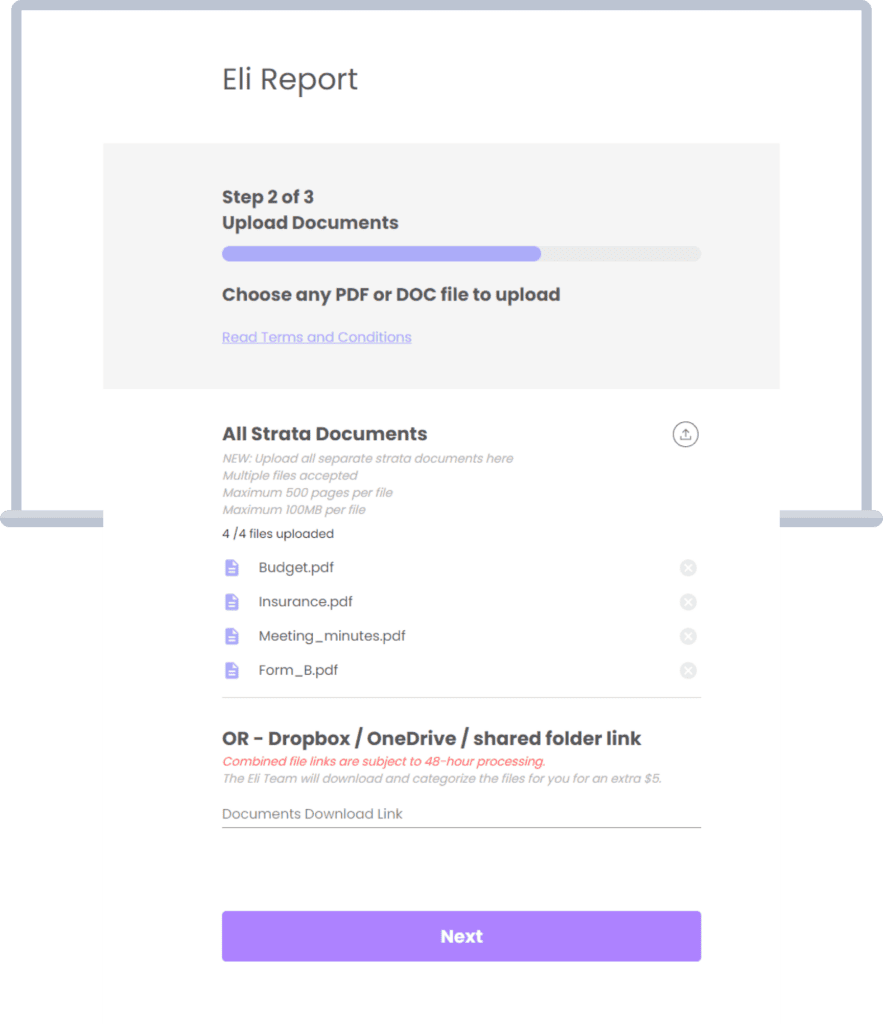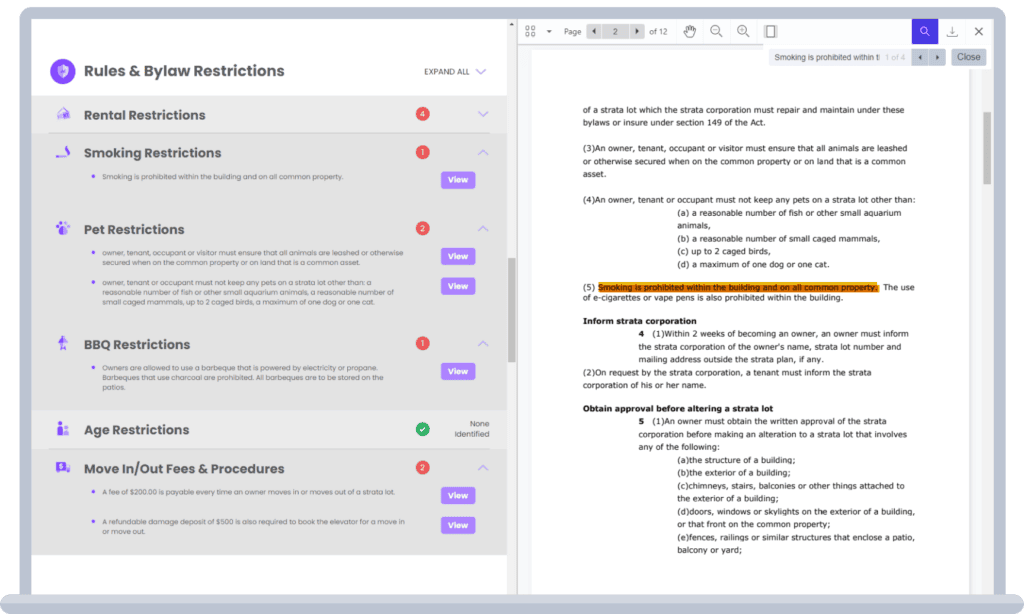When considering the purchase of a condo or apartment, you’re often faced with an important decision, should you get a condo inspection?
Or, save the money and remove any “Subject to Inspection” clauses in the offer?
This guide will help you understand if you should get a condo inspection, what information it will help you understand, and other important condo pre-purchase review steps. Such as reviewing other reports and automating condo document reviews.
Let’s dive in!
What is a Condo Inspection?
First, before we explore the benefits, it’s important to understand what a condo or apartment inspection is.
A condo inspection is an assessment conducted by a professional to review the unit’s physical condition. Typically this happens once an offer on a property has been accepted with a clause to allow for “Subject to Inspection”.
It’s an important part of any condo real estate transaction that will help inform the buyer of any obvious deficiencies, before the purchase of the property fully goes through.
The Importance of a Condo Inspection
While a condo or apartment inspection can cost anywhere from approximately $350 to $750, depending on the size and location of the unit (in New York this is about $400), it’s important to understand what this will get you.
1. Identifying Hidden Issues
Inspections can reveal problems not immediately visible during a casual walkthrough, such as plumbing leaks behind walls or electrical issues with outlets. While these may not be deal breakers, the inspection serves as an important tool for understanding what should be fixed after the purchase or negotiated on to finalize closing.
2. Financial Planning
This in-depth understanding of what may need to be fixed or upgraded, like appliances, can be a great financial planning tool. Helping you as a condo buyer understand what immediate or short-term upgrades to consider after the purchase.
3. Negotiation Tool
Depending on the degree to the findings and problems, condo inspection findings can be used to negotiate the purchase price or request repairs before closing. Keep in mind, if you’re buying a condo in a seller’s market, it may not be able to be used as a negotiation tactic, but an informative exercise as a buyer.
4. Peace of Mind
Knowing the unit’s condition will also alleviate concerns about the unit, especially if you’re a first time home buyer.
Areas Typically Covered
Now that you understand the importance of a condo inspection, it’s now time to understand what is and is not covered in these inspections. This will help you understand the areas that an inspector may miss, and what to do about those other additional risks.
Interior Walls
The inspector will look at the walls, ceilings, and floors to check for any cracks, water damage, or structural problems. Using special tools to measure moisture, they can see if there are any interior leaks or wet spots.
They will also examine windows and doors to make sure they open and close properly and are sealed well to prevent drafts or leaks.
Appliances
All appliances that are hooked up and will come with the unit will be checked, like stoves and dishwashers. They are tested to make sure everything is in working order. A good inspector will also note the age and condition of these appliances, giving you a heads up on any potential replacement requirements coming up soon.
Plumbing
The plumbing system is checked by turning on faucets, showers, and toilets to see if they work correctly and don’t leak. The inspector will measure the water pressure, check how well the water drains, and look at any visible pipes for signs of corrosion or leaks.
Electrical Systems
Things like electrical outlets, switches, and light fixtures are tested, and the electrical panel is checked to make sure it all works correctly. If the condo has areas like kitchens or bathrooms, the inspector will ensure these wet areas have special outlets with GFCI protection to prevent shocks.
Heating & Cooling Systems
Heating and cooling systems are tested to confirm they are running efficiently and keeping the condo comfortable.
Areas Not Covered in the Inspection
Condo inspections have limitations that are important to understand so you know the risks and other methods for inspecting areas the Condo Inspection team may miss, such as:
Common Areas
Any common areas of a condo or apartment complex are not inspected by the Home Inspector. Things like lobbies, elevators, and amenities are typically not included. Insights to the maintenance and standards of those areas will be in the condo documents.
Building Exterior
Roofing, siding, and foundations are usually the responsibility of the condo association and not part of the individual unit inspection. Again, any insights to the depreciation of the building and important upcoming maintenance is in the condo documents for review.
Shared Systems
Major building systems like central HVAC, main electrical panels, or shared plumbing stacks are generally excluded.
Inaccessible Areas to the Unit
Inspectors can’t examine things behind walls, move items out of place, or check under floors without causing damage. While they can use technology to see things like moisture behind the walls, they don’t cut in or open up the wall to inspect further.
Recommended Reading: Understanding your rights & what to expect when buying a condo
Get More Answers by Reviewing Condo Documents
While a condo inspection provides valuable insights into the unit itself, reviewing condo documents is equally crucial.
These documents provide insight into the association’s financial health, including reserve funds and budget priorities, as well as any upcoming projects like major repairs or renovations that could affect your costs.
You’ll also learn about the community’s rules and regulations to ensure they match your lifestyle, what the association’s insurance covers versus what you’ll need to insure, and whether any legal disputes could impact your investment.
And major work required? Special Levies?
Condo documents often disclose information about pending or potential special assessments. These are additional fees charged to owners to cover large expenses, such as:
- Major structural repairs
- Roof replacements
- Elevator modernization
- Parking garage renovations
For example, if the documents reveal a planned $1 million roof replacement project with inadequate reserve funds, owners might face a special assessment of $10,000 per unit. Being aware of such potential costs is crucial for financial planning.
Pro Tip: Use Eli’s Special Levy Forecast tool to automate your review of future levies.
Understand Depreciation Reports
Depreciation reports, also known as reserve fund studies, are critical documents that forecast future repairs and replacements. They typically include:
- A comprehensive inventory of the building’s components
- The expected lifespan of each component
- Estimated replacement costs
- A funding plan to ensure adequate reserves
For instance, a depreciation report might indicate that the building’s elevators will need replacement in 10 years at an estimated cost of $500,000.
This information helps you assess whether the condo association is financially prepared for such expenses or if special assessments are likely in the future.
How to Review Complicated HOA Documents in Minutes, Not Hours
Eli Report streamlines the review process, helping buyers, agents, and property managers quickly access important insights from HOA documents. Here’s how it works:
Step 1: Choose the HOA Files to Upload
Select relevant files like CC&Rs, bylaws, financial statements, and reserve studies for upload.

Step 2: Let Eli Run
Eli Report processes the documents, extracting key information.
Step 3: Review Your Report and Summarizations of Important Info
Receive a concise report highlighting essential details and potential issues.

Final Thoughts
Comprehensive condo due diligence involves both a thorough inspection of the unit and a careful review of condo documents.
While the inspection reveals the immediate condition of your potential home, the document review provides crucial insights into the long-term health and management of the entire property.
By combining these two elements, you gain a holistic view of your investment, helping you make an informed decision and avoid costly surprises down the line.
And be sure to speed up your condo document review process with Eli Report. Run a free report today.
